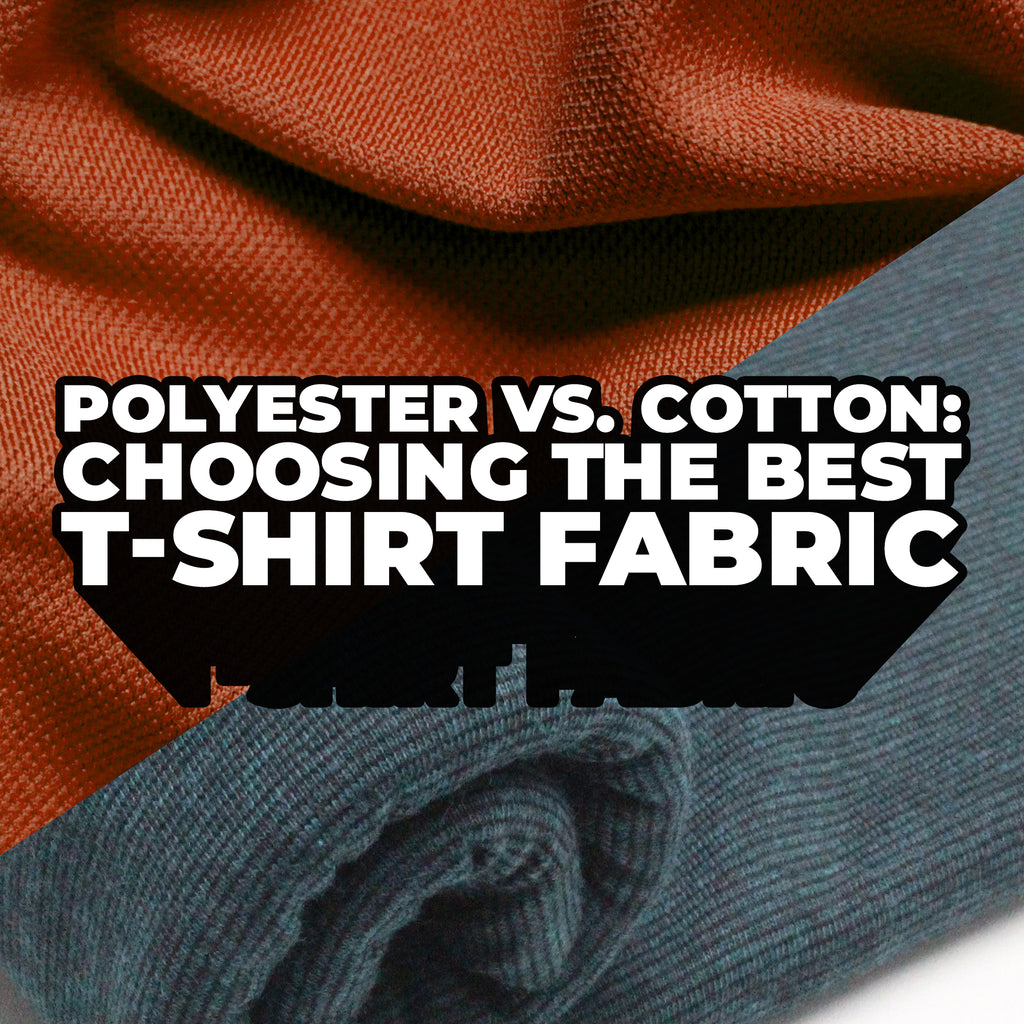Polyester vs. Cotton: Choosing The Best T-shirt Fabric
Posted by VS TEES

Aside from picking what shirt style to buy, the fabric is the second most significant consideration. Polyester and cotton are two of the most popular and widely used materials, and for a good reason. Both are reasonably priced and long-lasting enough to endure numerous piles of washing. However, depending on your specific needs, one alternative may be preferable. If you're attempting to decide between cotton and polyester garments, keep reading to learn about the benefits and drawbacks of each.
Cotton Facts

Let's have a look at this time-tested, widely used material. Cotton has been produced for decades and is still prevalent in the apparel business. Cotton is not an only natural material, but it is also softer than polyester.
Furthermore, ringspun cotton is the softest alternative and is quite popular among screen printers. Cotton gear from brands like Bella+Canvas is manufactured with airlume combed and ringspun cotton, extending on how soft cotton fabric may be made.
Cotton is breathable and comfy and is now the more cheap option when comparing polyester vs. cotton. Cotton is a commodity with a volatile price, yet it now outperforms polyester.
Cotton is also a good choice for people with sensitive skin because organic cotton is grown without using insecticides, chemicals, or pesticides. Cotton's benefits significantly exceed its drawbacks, which include post-dry shrinkage, color loss during washing, and perspiration retention.
Cotton Advantages
- Cotton has been used in clothing for a long time and is still one of the most popular textiles. It is a naturally occurring commodity whose low cost makes it an excellent choice for screen printers.
- It is softer than polyester, and ring-spun cotton, as opposed to ordinary cotton, produces some of the softest shirts on the market.
- Cotton absorbs moisture and helps regulate body temperature, making it suitable for year-round wear. Cotton fibers absorb color exceedingly well, making them an excellent choice for tie-dying and other similar projects. It is also biodegradable, which means it will decompose over time.
- Cotton shirts are also an excellent alternative for anyone with sensitive skin because they are soft and come in organic kinds. Cotton shirts are comfortable, making them a popular choice.
Cotton disadvantages
- Cotton is a commodity. Hence its price might change. Cotton is now less expensive than polyester, but this could change if the market changes.
- Natural fibers also wear out faster than synthetic fibers like polyester, and cotton is more prone to shrinking.
- Cotton may appear to be the more environmentally friendly alternative because it is a natural, sustainable material. However, cotton producers use more insecticides than any other materials. Of course, this does not apply to organic cotton.
Polyester Facts

Polyester is a synthetic fiber and is noted for its ability to wick away moisture. It, like cotton, is becoming a more popular option in the apparel business. Polyester clothing is wrinkle-resistant, fade-resistant, long-lasting, and durable. It is an excellent choice for an on-the-go worker who requires a robust shirt that can tolerate frequent wear and washing, and because polyester is less absorbent than cotton, it is also more sweat stain resistant.
Other moisture-wicking choices for performance and sports apparel are just not available in 100% cotton. Polyester, on the other hand, is more likely to have run and pulls, but it is the most durable.
Polyester Advantages
- Polyester is more stable than cotton in the face of market changes. As a synthetic fiber. This guarantees that the pricing remains stable. Its fibers are rigid and do not fray readily.
- It is also less likely to shrink or wrinkle.
- It is fade resistant and can withstand repeated washing and wearing. It is less stain-resistant than cotton because it is less absorbent.
- If you're seeking a moisture-wicking shirt, polyester shirts provide possibilities that cotton does not.
- In colder weather, the material also helps to keep the body warm.
- Polyester dries faster because of its lesser absorbency. Polyester clothing dries faster than cotton apparel. If you have predominantly polyester clothing in your closet, you could save money on your energy costs by not using your dryer as frequently.
- Because of its strength, lightweight feel, and moisture-wicking characteristics, polyester is popular among athletes. This makes it an excellent choice for jerseys and other athletic gear.
Polyester Disadvantages
- Polyester, despite being quite durable, often wear and tear.
- It is not as breathable and sticks to wet skin. Because the material is temperature sensitive, particular care must be used when decorating shirts with a heat printer to avoid melting or scorching.
- Polyester may not be suitable for sensitive skin because it has a little coarser texture than cotton.
Here's an overview of cotton vs. polyester for T-shirts and clothing:
- Cotton is a natural fabric, whereas polyester is a synthetic fabric.
- Polyester has several significant environmental and functional drawbacks.
- Despite this, it is inexpensive and adaptable.
- Cotton is incredibly soft, breathable, long-lasting, and natural.
- In the short run, this cotton may be more expensive.
- However, it can be a superior long-term investment because it lasts longer.
Conclusion
In our opinion, high-quality cotton is superior to polyester for T-Shirts and other clothes in almost every way. However, polyester-based synthetic fibers are typically more practical for activewear and outdoor wear.
Though a high-quality cotton tee or sweatshirt will set you back more than one made from a synthetic material like polyester, you should factor in the long life of the former. In the long run, it may be more cost-effective to splurge on a high-quality item that will last several seasons rather than buying a new one every few months.





